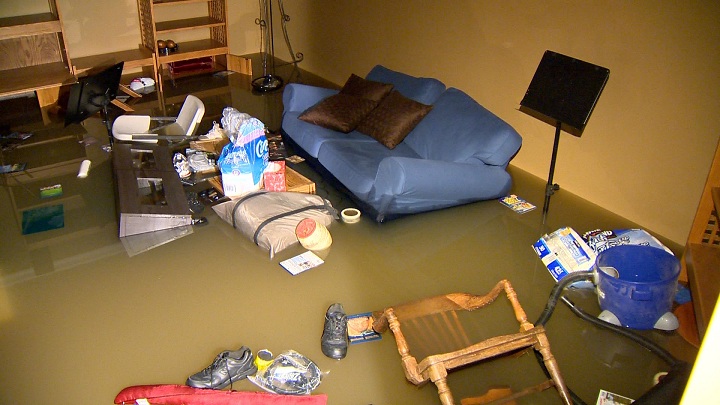Zafar and Laila Ismaili were putting away groceries after a long day at work when Zafar went to store a few items in the basement — and stepped into water at the bottom of the stairs.

It was May of 2017, and the couple’s home of 20 years in Waterloo, Ont., had just flooded after a torrential downpour.
Unlike many Canadians, the Ismailis were lucky to have sewer-backup insurance, which spared them rebuilding costs worth some $44,000. But the couple, who runs an eco-friendly printing business in Waterloo, still had to pay around $10,000 out of pocket for additional restoration work not covered by insurance.
SIGN UP: Global News has a new Money newsletter
READ MORE: Flooding, flooding everywhere – do Canadians have insurance for it?
And then, there was the psychological toll of seeing four inches of water covering their recently finished basement.
A year and several flood-proofing upgrades after the fact, the Ismailis are still living in fear of another possible leak.
Before, the couple would easily go weeks without setting foot in the basement, especially since their two grown children moved out of the family home, Laila said.
If it rains hard at night, she added, they’ll run downstairs to make sure the floor and walls are dry.

Get weekly health news
“It was a very, very sad, heartbreaking experience,” she said.
- Pizza wars? As U.S. chains fight for consumers, how things slice up here
- WestJet execs tried cramped seats on flight weeks before viral video sparked backlash
- Health Canada says fake Viagra, Cialis likely sold in multiple Ontario cities
- Canada increased imports from the U.S. in October, StatCan says
READ MORE: ‘This is a huge shock to us’ — What climate change means for home insurance
Many more homeowners across Canada have likely developed the same conditioned fear of rain, according to a recent study by the University of Waterloo’s Intact Centre on Climate Adaptation.
The research found long-term adverse mental-health effects from flooding, with affected households reporting higher-than-normal stress levels as much as three years after the event.
Nearly half of homeowners who have experienced flooding report that their anxiety rises whenever it rains, the report shows.
By comparison, only three per cent of homeowners who have never had to deal with a wet basement said they worry about rain.
WATCH: Here’s why cities flood more easily than rural areas

The study is based on a survey of 100 households in Burlington, Ont., where 3,500 homes flooded in August of 2014, following a storm that dumped nearly 20 cm of rain on the town over the course of seven hours. Research spoke to homeowners in flood-impacted neighbourhoods as well as a control group of families living within a 1-km radius who did not experience damages during the storm.
Although the fieldwork took place in Ontario, “the extrapolation of the results is national,” study co-author Blair Feltmate, who heads the Intact Centre, told Global News via email.
An estimated 1.7 million Canadian families – almost 20 per cent of the population – are at risk of overland flooding from things like overflowing rivers and lakes, according to the Insurance Bureau of Canada (IBC). And many others who do not live in floodplains may experience flooding due to so-called microbursts, sudden and extreme rainfall that can clog city pipes and cause sewer water to back up.
READ MORE: Is the home you’re buying at risk of flooding? It can be hard to find out
The average cost of a flooded basement is around $40,000 in Canada, and insurance payouts have more than doubled every five to 10 years since the 1980s, according to IBC data.
The Intact Centre report, which received funding support from insurers Intact and Manulife, represents the first attempt in Canada to quantify the mental-health costs of flooding and its potential implications for life, health and disability insurance as well.
“Purchase of sleeping aids, medication for Post-Traumatic Stress Disorder, as well as payment for visits to a naturopath, a counsellor or therapist, family doctor and a hospital are all financial costs due to health impacts that households attributed to a flood event,” according to the research.
The study also found that a flooded basement often forces people to take time off work, either to clean up or address mental-health issues caused by the event. Over half of households affected by flooding reported having to miss work, with seven days on the job lost on average.
READ MORE: Here’s how much climate change can cost homeowners in damages
That was the case for Zafar and Laila as well. The two often had to get to work late, leave early and take turns staying at home to wait for plumbers, carpet fitters and other contractors.
“It was very difficult to keep the business running and watch what was happening at home,” Laila recalled.
Now, she said, she is talking to her neighbours about having their homes professionally assessed for flood risk and taking precautions before the next storm hits.
“For us, it was an eye-opening experience,” she said. “It changed our lives.”









Comments